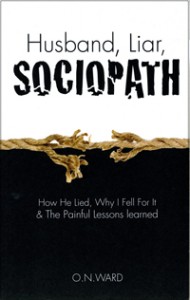Every week, a chapter of my book, “Husband, Liar, Sociopath: How He Lied, Why I Fell For It & The Painful Lessons Learned” (available via Amazon.com, just click on the title or book cover) will be published here on Lovefraud. To read prior chapters, please see the links at the bottom of the post.
Chapter 4: Love At First Sight Is Possible…Just Be Sure You’re Seeing Clearly
Paul was romantic, caring, and attentive. He took me to plays, cooked dinner with me, and shared hikes and long walks. When our relationship evolved to physical intimacy, he was an amorous but gentle lover. I felt so lucky to have found him.
By the time we started dating, Paul already had a contract to live in a graduate dorm during his second year in business school. There, he would have one small bedroom with a desk, share a bathroom with others on his hall, and everyone in his building would share a common room with one TV. In contrast, I had rented a small, comfortable, conveniently located apartment. He moved in.
I did not charge him rent. I convinced myself he could not get out of his rooming contract, and I had planned to pay the full rent myself anyway. He had sold his sports car to raise money for business school, so I gave him full access to my car. Perhaps giving more than I was getting financially was my way of proving what a nice, gracious, empathetic person I was and what a great wife and mother I would be.
Time passed quickly. My days with Paul were filled with shared classes, shared studying, shared dinners, shared trips to the gym, proofing each other’s resumes and cover letters, and helping each other prepare for job interviews. I admired Paul for his relaxed approach to business school compared to my more intense, stressed-out approach. I also respected his intelligence, ability to make quick decisions, and his natural, easy leadership style. He balanced me. I loved him, and I was sure he loved me. He told me so often.
We got away on a weekend to visit his family and then on another weekend for Paul to meet my parents and brother. Paul was reserved and tired when he met my family. He attributed his lethargy to exhaustion due to the grueling business school schedule. Later, Paul told me that he sought solitude because he did not enjoy my intellectual brother who kept trying to engage Paul in conversations about topics Paul cared little about.
Paul’s mother and father had divorced during Paul’s high school years. His alcoholic father had fallen on difficult times and not contributed financially to Paul and his two siblings, forcing Paul’s mother, Ruth, to resurrect her career as a paralegal to support the family. Ultimately, she married a successful lawyer. Although her second husband died only a few years after they were married, he had provided for Ruth in his will. While still having to work part-time, she was able to lead a comfortable life. By the time Paul started his MBA, his father was a recovered alcoholic and working again. He was invited to all family functions and was clearly making an effort to reconnect with his children. Although it was a family with their share of missteps, they appeared to have rebounded from personal strife and to enjoy each other’s company. I particularly admired Ruth’s strength, clear devotion to her children, and her forgiving spirit, which had allowed her to welcome her ex-husband back into family gatherings. She was also kind to me, in a matter-of-fact way.
While everything, or almost everything, seemed right between Paul and me, in retrospect some events seemed odd. Not, “Oh my God, he’s a psychopathic killer, run for the hills!” kind of odd, but enough that they left an impression. It is only now, two decades later, that I finally understand them. They were the red flags people tell you about, so easy to see in life’s rear view mirror but so difficult to read as you are speeding down the heady “freeway of love—”in a convertible with the top down, going twenty miles per hour over the speed limit and, unbeknownst to you, with a charming sociopath at the wheel. For me to notice them at the time, the flags would have had to be much bigger, and maybe even fluorescent. Having a friend jumping up and down screaming and pointing to them might have helped, too. (No such luck.) But, newly in love and, like most people, blissfully uneducated about the behavior of sociopaths, I did not see then what is so clear to me now.
Odd red-flag moments, such as pressuring me to stay up with him on New Year’s Eve even though I was sick, not helping me with my coursework even when he had nothing else meaningful to do, and offering minimal help with the subsequent insurance and repair logistics after he got into an accident with my car, all had one thing in common—they were situations or moments in which Paul’s and my goals conflicted, sometimes over the smallest things. They all started with pieces of a puzzle that I was sure would fit together but which, no matter which way I turned them, refused to cooperate. Even though my conscious mind brushed them off as inconsequential, some part of me was alerted to these “moments of weirdness,” as I came to call them, and they lodged in my memory, awaiting resolution.
Start from the beginning:
Go to previous chapter:
Go to next chapter:
Notes
Identifying names, places, events, characteristics, etc. that I discuss here and in my book have been altered to protect the identity of everyone involved.





































 What narcissists are really saying
What narcissists are really saying
NoLongerShocked
Hindsight – it’s the best way to see red flags. Unfortunately. With my P education and knowing how brilliantly they can hide, my first ‘trigger’ is going to be lack of an emotional connection, a feeling of distance and ‘sameness’ in emotional responses. But my God they hide so well that I can’t just depend on that.
It really is a case of putting all the little clues together. Some of the psychopaths in the public eye are blatant – other ones that get ‘outed’ here or elsewhere I go ‘Whaaaaat?” And then I read about them and what they got up to in private and I go, ‘Wow, I completely missed that.’
It sounds like your P was revealing his lack of empathy in the last few lines. The trouble is we can all be selfish, uncertain, insensitive or absorbed in other activities etc. at various times, so P behaviour can look quite ‘forgivable’ at first.
Thanks for this chapter, I’m enjoying reading it. Getting a bit worried about the upcoming chapters though. I still haven’t managed to get past about chapter 4 in H.G.Beverley’s book because it’s too painful. Some people might enjoy reading about pain, it rocks me to the core. Nothing to do with the P, just the way I am. I have to turn off the T.V. if anyone’s talking to the camera in tears, that sort of thing.
Will we learn about the root cause of Paul’s psychopathy? I was expecting to find out that his Dad was a P, or even his Mum, but they both seem normal (so far).
Thanks again!
stopbuggingme
It might be Mom who is a p only because in my case he made me look crazy/dysfunctional.
Hope Springs
Can you elaborate on that? On why it may be the mother who may be the P?
‘He made you look crazy / dysfunctional’…did he compare you to his mother in some way?
I am interested in why you think that. What were her traits, if you don’t mind me asking?
stopbuggingme
He did not compare me to his mother it was my reaction to him discarding me that made me panicky and appear dysfunctional while his demeanor was that of a victim of me but in a very unemotional way, when he was the one leaving without explanation. The crazy making of the p.
Hope Springs
Yes, I think I understand.
I still wonder why you think the P may be his mother. Did you meet her and if so, what was she like?
I am so curious about women who may be or are Ps.
Had he claimed to you to either like or dislike his mother, at all? Or, did he allege abuse or abandonment by her at all?
stopbuggingme
I was referencing Pauls mom. My mom was the narcissist, my dad the alcoholic that later I saw as him numbing to escape but a way to be able to stay married to my mom. My dad did stop drinking later but became sick with cancer and my parents relationship deteriorated when he became accountable and wanted my mom to be accountable for her actions. She ended up emotionally abandoning him while he was dying. And his death became about her.
Aware
Bev,
In many cases its emotional incest done by the mother to her son, engulfment. My freaks mother was raised in foster homes and he is her first born.
At first I thought she was so engulfed because he was “STRANGE” but now I think hes strange because she didn’t let him separate.
He told me she used to follow him into dressing rooms while shopping when he was in high school, she listened to all of our conversations, she got nervous when he told her he loved me, she told me she used to get into the sandbox with him at the park when he was a child because he didn’t make friends like his 2 younger brothers did. Maybe he didn’t make friends because he was part of her freakiness. Just sayin, its all too sad, very sad.
Hope Springs
Sad…and depraved. Wow, huh?
The mother had problems of her own, so the son may not have been ‘born’ with a disorder, per se.
Entirely different from our situation with our son. He was on his own path from day one.
Hope Springs
Okay, I understand now.
So insightful of you to see what was happening in your own family dynamic. I can see why your dad may have drank to cope with what he ‘saw’ or felt in your mother’s behavior. Thank you for that sharing.
I too am interested in the rest of this story and what may be revealed.
It could be that neither of Paul’s parents are N/P/SP, but then again, one or even both of them could very well be.
Thank you again for sharing. You are very emotionally insightful. I think we become even more so that way when we have dealt with ‘those’ people, in whatever way or relationship, to us.
Cheers 🙂
slimone
Moments of weirdness indeed. With one socio I dated he was the more obviously narcissistic type, and in that case it would seem reasonable to think the red flags would stand out. But in fact it was the same…I filed them under weird, but not under the alarming catagory. He was SO outrageous that he was just thought of as ‘a character’, new agey type. So it was almost harder to pin down if he was just being ‘unique’ or if these were indeed alarming behaviors. And just like ON WARD it was only in hindsight I could see that there were lots and lots of early signs that he was disordered.
Sunnygal
slim- we see in hindsight.